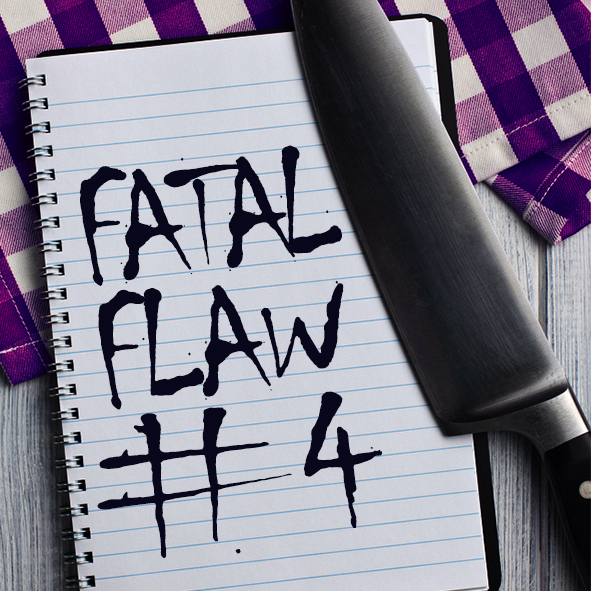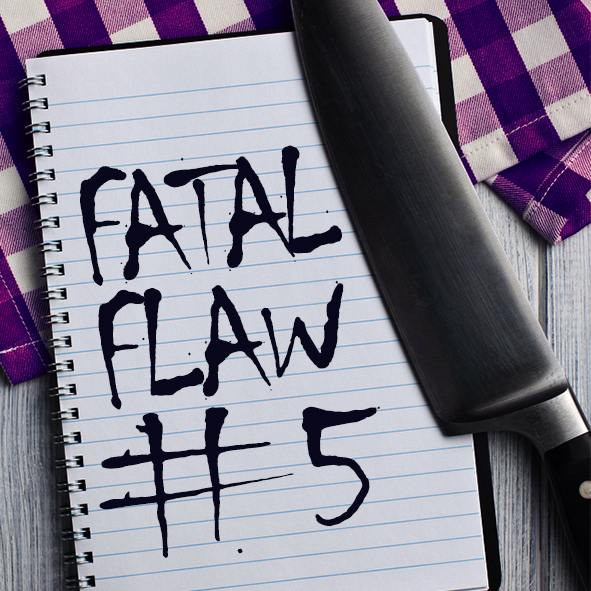Writers: Beware of Body Parts Behaving Badly
This month our editors are tackling Fatal Flaw #10 – Description Deficiencies. Too many manuscripts are lacking essential description–of characters, setting, time or day and year, how much time has passed from scene to scene. These make for weak scenes and weak novels. Today, editor Christy Distler addresses a fun but serious topic–improper description of body parts. See if your writing contains this fatal flaw!
We’re covering description deficiencies this month, and today I’m going to talk about “floating body parts,” or FBPs. If you’ve been writing fiction for some time, chances are you’ve seen editors and other authors discourage their use.
Now, I’m not talking about the severed leg that washes up on the coast in a murder mystery—that’s a perfectly acceptable floating body part. There’s another kind of FBP that’s actually all too common in fiction: when a character’s body parts start acting of their own volition. While we’re at it, we may as well look at a couple of confusing clichés that can have multiple meanings too.
Here are some examples, along with some parenthetical snark.
FBPs:
- Her eyes flew across the room. (So her eyes popped out of her head, grew wings, and took flight? Eww.)
- His jaw dropped to the floor. (Whoa. Now that is one huge mouth.)
- Her face fell. (Did it bounce when it hit the floor?)
- His eyebrows hiked to his hairline. (That would require some seriously stretchy skin.)
- Her sad eyes held him in place. (Strong grip they have.)
Confusing clichés:
- He threw up his hands. (Who wouldn’t vomit? Hands are not meant to be snack food.)
- She shot her arm out to catch him. (Did she use a gun or a cannon?)
The list could go on and on—and I’m sure you could add plenty that you’ve come across in books you’ve read. Even well-known authors use them. (Note: Just because popular writers use them, doesn’t mean that lesser-known writers will get away with such writing unscathed. In the fiction world, the big names sometimes can pull off things that other writers will get criticized for.) Which brings us to a couple of questions.
First, why do writers use FBPs and clichés?
- Other writers use them.
- Writers think FBPs/clichés are more “creative.”
- Writers think FBPs/clichés give more variety to their sentence structure. Starting sentences with “his,” “her,” or “my” provides a break from so many sentences beginning with “he,” “she,” or “I.” This is particularly true with first-person point of view, where it can be difficult to not use a beginning “I” a lot.
These explanations may seem pretty legit (the last one definitely is), so this brings us to our second question: What’s wrong with FBPs and clichés?
- They tend to result in exaggeration or misread meaning, often to the point of absurdity. While ridiculousness may be quite entertaining in some forms of media (think Victor Borgia), it’s going to turn off fiction readers unless they’re hoping for some slapstick action.
- They convey weakness in writing. Great writers are known for fresh wording. FBPs and clichés imply that the writer couldn’t (or chose not to) come up with a better way to describe something. In this case, taking a shortcut isn’t going to work in anyone’s favor.
- They remove the importance from the character and place it on an object. Downplaying the character usually doesn’t benefit a story. The reader’s bond with a character is a primary reason readers keep turning pages, so diminishing that relationship should be done with much care.
Ready to see some FBPs, confusing clichés, and their fixes? Here goes…
BEFORE:
As we left the residence hall, two boys about my age approached us on the pathway. They stopped laughing as soon as our eyes met, and their feet scooted them to one side to give us room.
“Hey. You must be new here.” The taller boy halted, facing us. He smiled as his hand combed back through his dark hair. “I’m Connor. He’s Landon.”
My face fell, an unfortunate consequence of my shyness with guys I didn’t know, and I forced my eyes back to his. “Hey. I’m Cassie.”
Landon’s eyebrows jumped up in greeting. “Hey, Cassie. Morning, Mrs. Gray.”
A smile leapt to her face. “Good morning, boys.”
“Well, we’ll see you around, Cassie.” Connor shot his arms out from his sides. “Welcome to Covington Hall.”
AFTER:
As we left the residence hall, two boys about my age approached us on the pathway. They stopped laughing as soon as our gazes met and then moved to one side to give us room.
“Hey. You must be new here.” The taller boy halted, facing us. He smiled as he combed his hand back through his dark hair. “I’m Connor. He’s Landon.”
I automatically looked to the ground, an unfortunate consequence of my shyness with guys I didn’t know. Drawing a breath, I stared right at him. “Hey. I’m Cassie.”
Landon raised his eyebrows in greeting. “Hey, Cassie. Morning, Mrs. Gray.”
She grinned. “Good morning, boys.”
“Well, we’ll see you around, Cassie.” Connor spread his arms wide. “Welcome to Covington Hall.”
I don’t need to point out the differences between to the two examples; they’re pretty self-explanatory. The Before passage sounds pretty silly, and the After passage tells the same story without the animate body parts.
I do want to answer one more question before concluding though.
When are FBPs and clichés not discouraged?
- If the body parts truly are acting on their own—for example, “His hair stuck out in all directions.” He’s not making his hair stick out; bedhead is involuntary (most of the time). Here’s another: “Her legs gave out.” She’s not making her legs give out; in this case, she has no control of them. Or, “His hands shook.” Again, it’s a reflexive action, which is fine.
- If, for some reason, the POV character can’t see what’s going on. Perhaps a character has blacked out and is just coming around. She hasn’t opened her eyes yet (or her vision hasn’t returned), but she can feel a hand shaking her arm. The hand is what she’s going to focus on, and she may not know who’s shaking her arm. Maybe she was in a room full of people or walking along a busy street, and the shaker could be one of many people. She will feel the hand on her arm though, so describe that.
- If there’s no other good way to say something—for example, “He rolled his eyes.” Some people consider this a confusing cliché (where did he roll them to?), but everyone knows what it means. Furthermore, how else do you describe it without it sounding awkward? “He shifted his eyes upward and to the side in annoyance” sounds absurd. Instead, stick with what’s known.
- If the body part (briefly) deserves more importance than the character’s action—for example, “His hand closed over mine, wonderfully warm on my near-frozen skin” has a much different sound than “He closed his warm hand over my nearly frozen one.” In this case, temporarily giving the body part more emphasis can work in a writer’s favor.
As always, keep in mind that breaking the “rules” isn’t always unacceptable. Rules usually have good reasoning behind them, but there are writers who break rules well. And chances are, an FBP here or a confusing cliché there isn’t going to get a story tossed aside. Just use them with care, because overuse will weaken the writing and may turn off readers.
Your turn:
So what’s your take on flying body parts and confusing clichés? What ones make you cringe to read? Do you use them a lot, a little, or never? Can you think of other examples of when FBPs and clichés could be used well?










Flying body parts bug me, but I find meaningless body language even more frustating, e.g., nodding or smiling ad nauseum. Or setting too many scenes in a restaurant or kitchen simply to give the characters something to do with their bodies, e.g., she set the cup down. Who the heck cares? But if the cup clatters into the saucer after she’s said, “I’m fine,” then maybe she doesn’t really feel that fine at all.
When writers don’t search for ways to make the characters’ body language mean something (reveal character, emotions, make the scene truly visual, etc.) and then don’t search for fresh ways to word the body language, the story is weakened considerably.
I totally agree. Smiling and nodding (and chewing the lip—do people really do that? ?) especially bug me when they’re overused. This is one of the reasons I like to people watch. Gives you so many more options for body language.
Clearly you haven’t watched enough scenes of coyness between young lovers in Bollywood films. They’re chewing lips left and right — literally! :>
Funny! Maybe they didn’t get the memo about badly behaving body parts!
Maybe we’ve found the culprit then. 🙂 I’m fine with biting the lip if it’s occasional, but chewing? Nope, nope. That’s why we have gum.
“search for ways to make the characters’ body language mean something” (from the paragraph of your comment)
I’m guilty of using moving body parts during dialogue to insure I don’t have just a talking head. But you’re right. I should have those movement mean something every single time.
Good point.
Sometimes body movements say even more than dialogue does.
I think that’s why a lot of writers also like to people watch. Since we’re not engaged otherwise, we focus more on the physical aspects of what’s going on.
Good point, Glynis, which is why having a THAD (talking heads avoidance device) is so helpful. With meaningful activity, those body parts can be doing meaningful motions, right? https://www.livewritethrive.com/2015/10/12/talking-heads-avoidance-device/
Awesome post as always. Thank you! I’ve always been thrown by those times when a character tosses her head. The wild mane gets me too. So many heroines have apparently the most unmanageable wild hair. Kind of freakish even. I’m also on team “Quit biting your lip.”
Lol. I so agree about the wild mane. I’ve seen that in quite a lot of books lately, especially Western fiction. Having curly hair, I know what “wild” can look like and generally it’s not such a good thing. 🙂 And I’ve yet to look another person with long hair and think, “Wow. That hair could be equine.”
I think floating or shooting bits of anatomy can soon reek of needless melodrama. Like “Her eyebrows shot up” or “His arm shot out.” I’ve read a few others that sound phony, too.
“Her eyes darted toward the door” might pass in a suspenseful scene. As for lip-chewing, some nervous people do bite their lip. But some of these actions are more Hollywood stereotypes than reality.
Exactly.
Thanks for your input, Christine!
Somehow, I don’t think I’ve ever gotten into the habit of FBPs. Maybe it’s because I’m too much of a realist, which may be a drawback for a fiction writer. Eyes don’t fly. Period. I have thought about using some of the clichés about body part though. However, I haven’t yet, and after reading this post, I think I’ll leave them alone.
We’re in the same boat then. I’m a realist as well, and while it probably does have a few drawbacks in fiction writing, I think it also has some pros, such as keeping us from writing melodrama. And most of our readers will thank us for that! 🙂
“Some people consider this a confusing cliché (where did he roll them to?), but everyone knows what it means. Furthermore, how else do you describe it without it sounding awkward? “He shifted his eyes upward and to the side in annoyance” sounds absurd. Instead, stick with what’s known.”
Ditto for a few other expressions. I avoid making body parts perform independent actions. However, sometimes throwing one’s hands in the air (and similar phrases) work best to represent the voice of a story’s narrator–especially when written in first-person POV. We’re not all university professors or grammarians, and the narrative of our characters should reflect their personalities.